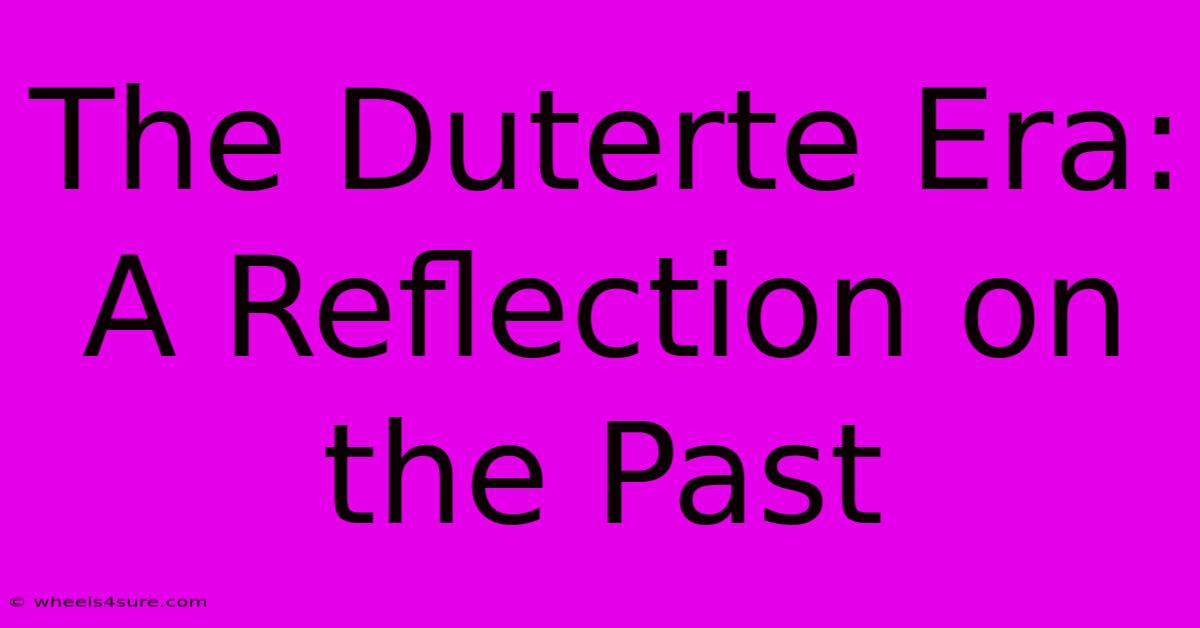The Duterte Era: A Reflection On The Past

Table of Contents
The Duterte Era: A Reflection on the Past
The presidency of Rodrigo Duterte (2016-2022) remains a deeply divisive and intensely debated period in Philippine history. His six-year term was marked by a distinctive brand of populist leadership, characterized by strongman tactics, a controversial "war on drugs," and significant shifts in domestic and foreign policy. This article offers a reflection on his legacy, examining both its achievements and its criticisms, without taking a definitive stance.
A Populist Rise to Power
Duterte's ascent to the presidency was remarkable. Capitalizing on widespread public dissatisfaction with traditional politics and a yearning for decisive action against crime, he presented himself as a strongman who wouldn't be hampered by bureaucratic constraints. His campaign rhetoric resonated with many Filipinos frustrated by the perceived slow pace of change and the persistent problems of corruption and criminality. This resonated particularly strongly amongst the lower socio-economic classes.
Key Campaign Promises:
- The War on Drugs: This became the defining feature of his campaign and subsequently, his presidency. He promised a brutal crackdown on drug use and trafficking, pledging to kill tens of thousands of criminals if necessary.
- Infrastructure Development: "Build, Build, Build" was a central plank of his platform, promising significant investments in infrastructure projects across the archipelago.
- Change and Reform: Duterte tapped into a widespread public desire for fundamental changes to combat deeply rooted issues such as corruption and inefficiency.
The "War on Drugs" and its Aftermath
Duterte's "war on drugs" remains the most controversial aspect of his presidency. While supporters credit it with reducing crime rates in some areas, human rights organizations and international bodies have condemned the immense number of extrajudicial killings. The exact death toll remains disputed, but thousands of suspected drug users and dealers were killed, raising serious concerns about human rights violations and due process. The widespread killings sparked international condemnation and calls for investigations.
International Scrutiny and Human Rights Concerns:
The brutal nature of the anti-drug campaign drew significant international criticism. The International Criminal Court (ICC) initiated a preliminary examination into potential crimes against humanity. The high number of civilian casualties overshadowed any potential successes in reducing drug-related crime.
Economic Policies and Infrastructure Projects
The "Build, Build, Build" infrastructure program aimed to modernize the Philippines' infrastructure, focusing on roads, bridges, railways, and airports. While some projects were completed, the program faced challenges, including delays, cost overruns, and concerns about transparency and accountability. The long-term impact of this massive infrastructure undertaking is still being assessed.
Economic Growth and Development:
While economic growth was recorded during Duterte's presidency, its distribution and sustainability remain points of contention. Critics argue that the benefits were not evenly distributed, and the long-term economic consequences of his policies require further analysis.
Foreign Policy Shifts and Pivot to China
Duterte's foreign policy marked a significant shift from previous administrations. He pursued closer ties with China, downplaying long-standing alliances with the United States. This realignment reflected a pragmatic approach aimed at securing economic benefits and reducing reliance on traditional Western allies.
Balancing Relations with Major Powers:
Navigating relations with the US and China presented a major challenge. While seeking closer ties with China, Duterte also maintained some level of engagement with the US, attempting a delicate balancing act between these two global powers.
A Legacy of Contention
The Duterte era leaves behind a complex and multifaceted legacy. While supporters point to achievements in infrastructure development and decisive action against crime, critics highlight the devastating human cost of the drug war and concerns about human rights, democratic backsliding, and the erosion of checks and balances. A complete and unbiased assessment requires a comprehensive examination of all aspects, and its lasting impact on Philippine society will likely be debated for years to come. The Duterte era serves as a crucial case study in the complexities of populist leadership and the interplay between security, human rights, and economic development. Further scholarly research and critical analysis are needed to fully understand its long-term consequences.

Thank you for visiting our website wich cover about The Duterte Era: A Reflection On The Past. We hope the information provided has been useful to you. Feel free to contact us if you have any questions or need further assistance. See you next time and dont miss to bookmark.
Featured Posts
-
Understanding The Nuances Of Albanias Age Of Consent
Apr 08, 2025
-
A Critical Examination Of Woody Allens Life And Choices
Apr 08, 2025
-
Khaby Lames Net Worth How He Built His Empire
Apr 08, 2025
-
Renee Butcher Inspiring Women Of All Ages
Apr 08, 2025
-
Que Son Las Bacterias And How They Shape Our World
Apr 08, 2025
